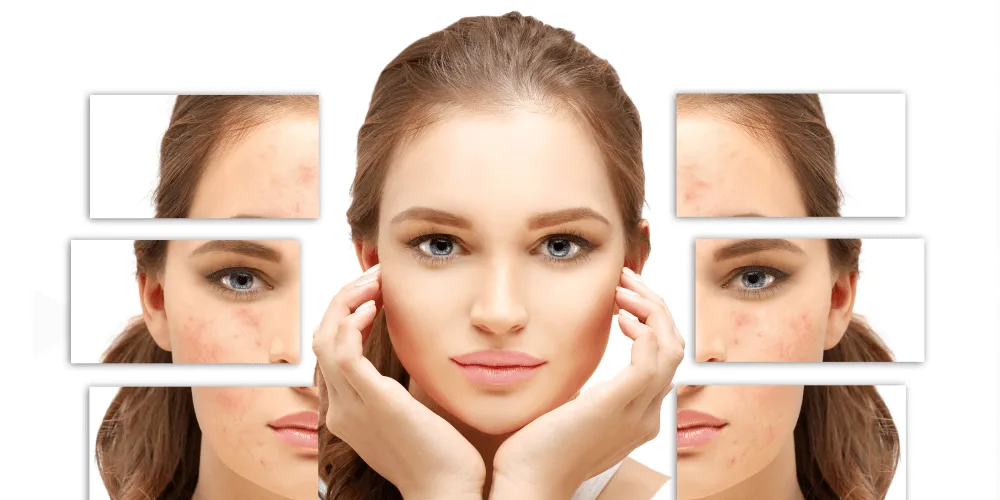What is Acne?
Skin follicles are affected by acne, which is a persistent skin disorder that leads to their obstruction and enlargement. It causes comedones (both blackheads and whiteheads) to form, both of which have the potential to become irritated and infected. Pigmentation changes and scarring can result from the inflammation.
Aside from the face, it can also affect the body’s central regions, including the chest and back.
What causes Acne?
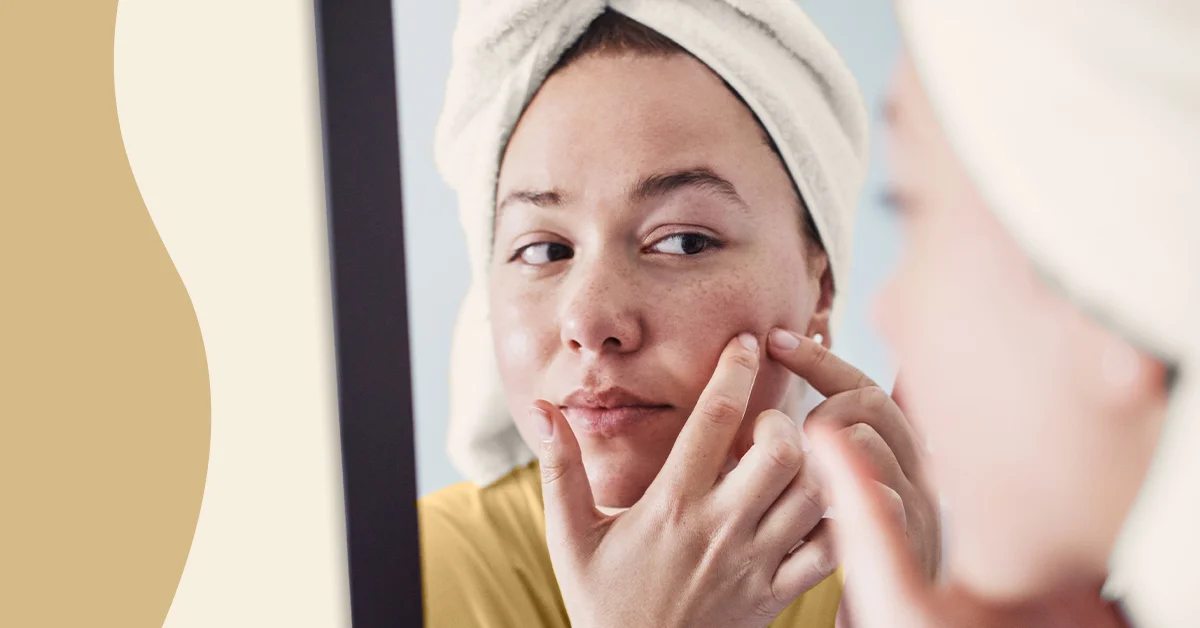
So many variables are involved. Millions of pilosebaceous follicles, or pores, can be found all over the human body. They serve to enclose the hair follicle, which lies dormant beneath the skin. Sebum, a viscous, sticky material secreted by the follicle, serves to moisturise and protect the skin.
There are thought to be four main contributing factors to acne
- The quantity of keratinocytes (a type of cell) has dramatically increased. These cells constitute 90% of the epidermis, the outermost layer of skin. Comedones are formed when the cells lining the follicles fold over and close off the follicles, a process that is unique to acne.
- Increased sebum production from the follicles acts to clog pores.
- There has been an excessive growth of many bacterium kinds. The discharge of signalling molecules from these cells accounts for the fourth variable.
- Inflammation
The interplay between these factors and the precise roles they play in the process are both unknowns at this time.
What are the different types of acne?
The existence of cysts and inflammation, as well as the quantity of comedones, determine whether acne is classed as mild, moderate, or severe.
The following types of acne have also been noted:
Infantile acne
occurs in the first year of life. Most cases clear up on their own within a few months, and while the reason is unknown, it is unlikely that treatment will help. If symptoms persist, the same treatments used for adults can be tried, though it is best to have a professional opinion. Rare cases of acne in children aged 2 to 6 warrant further examination in order to rule out a serious underlying condition.
Hormonal acne
The hormones in our bodies play a crucial part in how our skin works. As testosterone plays a key role in stimulating sebum production, an excess of this oily secretion can cause a buildup of debris in the pores, which can then contribute to acne. This may have a role in cyclical acne, which tends to flare up at specific phases of a woman’s monthly cycle.
What sets men apart from women is their production of testosterone, which is also done by women, albeit in much lower quantities. The hormonal shifts that occur naturally during menstruation can tip the scales in favour of testosterone and cause acne right before a woman starts menstruating.
Menopausal Acne
Perimenopause and postmenopausal women also experience hormonal abnormalities. Acne can develop later in life when Testosterone influences the pilosebaceous units due to a decline in Oestrogen. An alarming 15% of American women in their 50s and beyond have reported having acne, according to a recent survey.
One research of 280 patients with adult acne found that sunshine was a trigger for 33.2% of patients, cosmetics for 14.3%, and stress for 25.7%. (4) Obesity, which affected 6.4% of patients, was also a factor.
Insulin resistance, caused by elevated levels of insulin in the blood, can worsen obesity by encouraging the body to produce even more testosterone.
Puberty and Teenage Acne
Puberty is associated with an increase in acne incidence. One or more of the following could be true.
Around puberty, a surge in sex hormones causes a rise in Dihydrotestosterone, which stimulates the sebaceous glands near the hair follicles. Because of the increased sebum production, the skin may become oilier and more prone to breakouts. Comedones form when sebum and inflammatory substances from the sebaceous glands combine to clog pores and trap dead skin (white heads). The comedone can burst if inflammation increases.
Adult acne
Sunlight, stress, tobacco use, insufficient sleep, food, and cosmetics have all been linked to an increase in acne in adults.
Stress
An increase in environmental stress triggers the release of the hormone CRH from the brain’s executive control regions. By stimulating sebaceous glands directly, this makes the skin oilier and more prone to breakouts. The fact that CRH causes more testosterone to be made just makes matters worse.
Smoking
Tobacco smoke removes antioxidants from sebum and raises levels of specific lipids, both of which contribute to the proliferation of skin cells and the development of comedones.
Cosmetics
Acne can be worse by oil-based cosmetics such as moisturisers, foundation, and pomades (wax-based compounds used to style hair). Lanolin, petrolatum, vegetable oils, butyl stearate, lauryl alcohol, and oleic acid are all ingredients to stay away from.
Pregnancy
In most cases, acne clears up during the first trimester of pregnancy, but the rise in maternal androgens in the second and third trimesters might make acne worse (male hormones such as testosterone). It is best to see a pharmacist about safe treatment alternatives if you are pregnant and having symptoms.
Endocrine causes
Acne is a common presenting ailment, especially in cases of polycystic ovary syndrome (PCOS) where elevated androgen levels are prevalent. Cushing’s disease and androgen-secreting tumours are two more endocrine reasons. See your doctor for hormone testing if your acne doesn’t clear up with traditional treatment or if you’ve recently developed other symptoms of high testosterone, such facial hair.
Oxford Online Pharmacy – Acne Treatment
Lymecycline 408mg Capsules
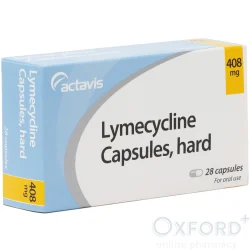
Acne can be helped by the antibiotic lymecycline. Your online GP consultation with a UK-based doctor is free, and you can get it from the reliable Oxford Online Pharmacy.
The antibacterial effects of lymecycline enable for the healing of existing acne lesions while simultaneously blocking the development of any new scars or spots. Lymecycline, an antibiotic belonging to the tetracyline class, is typically used to impede the progress of germs. Propionibacterium acnes is a type of bacteria that can be killed by interfering with its capacity to create survival proteins. Hence, the germs are unable to multiply and spread. By doing so, your immune system can focus on fighting off the preexisting bacteria.
- Effective treatment for acne
- Once-daily dose
- Also available as a branded product (Tetralysal)
- Lower cost than the branded product
- Works by reducing bacteria’s ability to grow
- Larger pack sizes are available
Doxycycline 50mg 28 Capsules
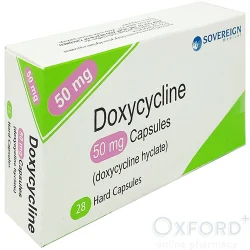
Doxycycline is an antibiotic that can be used to treat moderate to severe inflammatory acne, as well as mild acne that has not responded to other treatments. It’s a tetracycline, thus it kills bacteria by preventing them from reproducing. The antibiotic doxycycline is highly effective in treating acne because it prevents the growth of acne-causing bacteria. Cutibacterium is the name for the bacteria that causes acne.
With reduced inflammation, doxycycline reduces the appearance of acne’s characteristic pustules and redness.
In order to get rid of acne, several specialists suggest using doxycycline in conjunction with a topical treatment like Adapalene (Differin) gel.
Depending on the severity of your condition, doxycycline’s antibacterial properties may not kick in for up to 12 weeks, and it may take up to two weeks before you start to feel better.
- Acne therapy that is both effective and safe for use on mild to moderate inflammatory acne that has not responded to prior therapies.
- You may see an improvement in your acne in as little as 2 weeks.
- Helps with redness and inflammation
- Does its job by stopping the growth of acne-causing bacteria.
- For optimal results, combine these pills with a topical acne treatment.
Rozex Cream (for Rosacea) 0.75% 30g
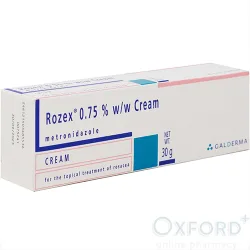
Oxford Online Pharmacy is proud to offer Rozex Cream (0.75% 30g), an effective ingredient formulated to reduce the appearance of rosacea on the skin. This cream helps eliminate the redness, bumps and other visible symptoms associated with this often embarrassing condition. Used twice daily, Rozex Cream not only helps improve skin’s appearance, but also the confidence its user will feel! Oxford Online Pharmacy stands behind this product’s quality and effectiveness – try it today and see for yourself!
Freederm Fast Track 25g
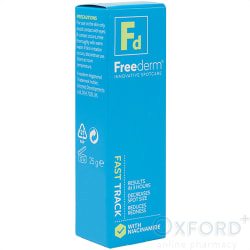
Acne spots, both in size and redness, respond quickly to Freederm Fast Track, a rapid action gel. It works to reduce the appearance of skin imperfections and fight bacteria in less than three hours after application.
Freederm Fast Track should be stored in a cool, dry area, away from light and heat and out of the reach of children.
- For Spot-Prone Skin
- Works in under 3 Hours!
- Available without Prescription
Freederm Treatment Gel 25g
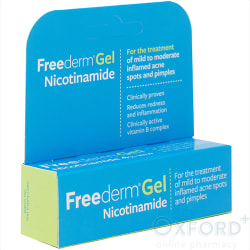
Translucent in appearance, the active ingredient in Freederm Therapy 25g Gel is Nicotinamide. Acne and spot inflammation can be alleviated with nicotinamide because of its anti-inflammatory properties. It comes in two different tube sizes (10g and 25g) and can be used by people of all ages.
Formulation Freederm 25g Therapy Protect children’s safety by storing gel where it can’t be seen or reached. The recommended storage temperature is below 25 degrees Celsius, and it has a shelf life of just 2 months once opened.
- Helps to calm the skin irritated by acne
- You can start to notice improvements in as little as several weeks
- Treats pimples and spots with its anti-inflammatory activity
- Specially formulated for sensitive, spot-prone skin
- Non-prescription product
About Oxford Online Pharmacy

With roots dating back three generations to 1925, Oxford Online Pharmacy is a registered trade name of Frosts Online Ltd.
Their team is directed by Stuart Gale, Managing Director and Pharmacist, and Robert Bradshaw, Pharmacist and Supervisor Pharmacist.
A legitimate UK pharmacy with a focus on bringing the principles and history of its Oxfordshire-based brick-and-mortar counterpart to its online platform. The patient’s well-being comes first, and the best possible treatment is promised to each and every one who visits the site.
Only a few of online pharmacies, including Oxford Online Pharmacy, have recently passed CQC inspections for digital healthcare providers across all care types.

